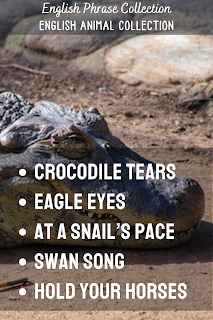Animal Magnetism: A Guide to 5 Common Idioms Involving Animals
Idioms are a fascinating aspect of the English language, and animal based idioms are particularly intriguing. From "barking up the wrong tree" to "let the cat out of the bag," these expressions often involve animals in creative and unexpected ways. In this blog post, we'll explore five animal idioms in English and their meanings.
Crocodile Tears
The expression "crocodile tears" refers to fake or insincere displays of emotion. The phrase comes from the ancient belief that crocodiles would shed tears while devouring their prey. However, it's now known that crocodiles do not cry while eating, and the expression has taken on a more metaphorical meaning. If someone is said to be shedding crocodile tears, it means that they're pretending to be upset or sympathetic when they're actually not.
Example: "She said she was sorry for what she did, but I could tell she was just shedding crocodile tears."
Eagle Eyes
To have "eagle eyes" means to have excellent vision or to be very observant. Eagles are known for their sharp eyesight, which allows them to spot prey from great distances. If someone has eagle eyes, they're able to see details that others might miss.
Example: "My mom has eagle eyes. She can always find the smallest typos in my essays."
At a Snail's Pace
If something is moving "at a snail's pace," it's moving very slowly. Snails are known for their slow, deliberate movements, and this expression reflects that. When we say that something is moving at a snail's pace, we mean that it's taking a long time to make progress.
Example: "We were stuck in traffic for hours. The cars were moving at a snail's pace."
Swan Song
The expression "swan song" refers to a final performance or act before retirement or death. The phrase comes from the ancient belief that swans sing a beautiful, mournful song just before they die. While this isn't actually true, the expression has taken on a metaphorical meaning. If someone is said to be giving their swan song, it means that they're giving their final performance or doing their final act before retiring or passing away.
Example: "The musician's last concert was her swan song. She gave an incredible performance."
Hold Your Horses
When someone tells you to "hold your horses," they're telling you to be patient or to wait. The expression comes from the practice of using horses to pull carts and carriages. If the horses started moving too quickly, the driver would have to pull back on the reins to slow them down. When we tell someone to hold their horses, we're essentially asking them to slow down or wait.
Example: "Hold your horses, we're not ready to start the meeting yet."
In conclusion, animal idioms are a fun and interesting way to add coloгr to the English language. Whether you're shedding crocodile tears or moving at a snail's pace, these expressions can help you convey meaning in a memorable way. So, the next time you hear one of these animal idioms, you'll know exactly what it means!


No comments:
Post a Comment